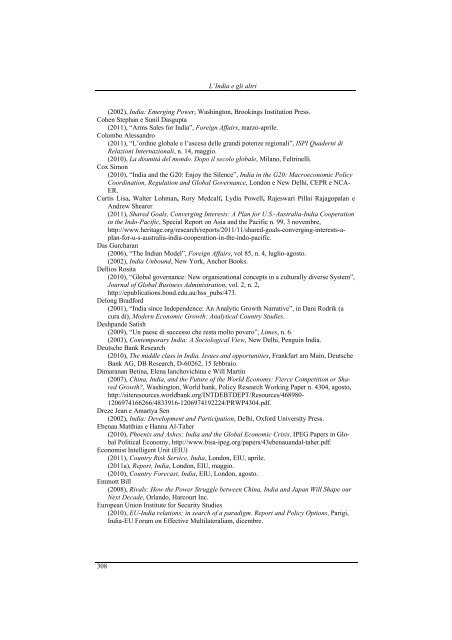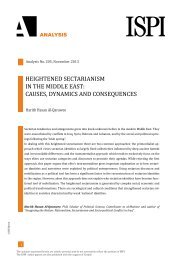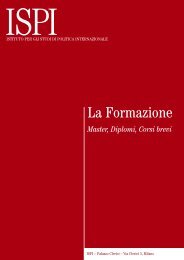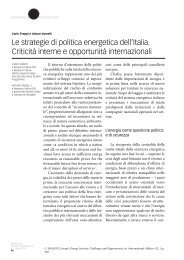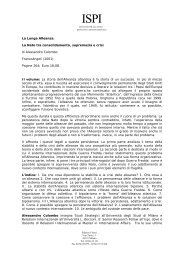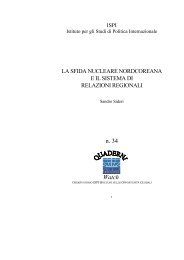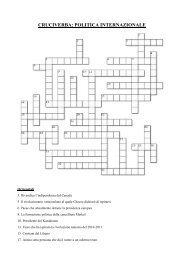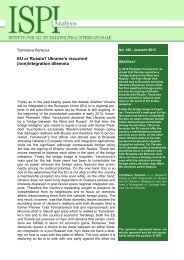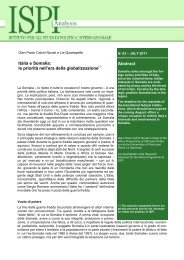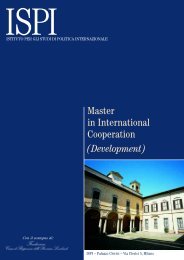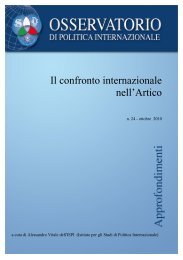L'India e gli altri Nuovi equilibri della geopolitica - Ispi
L'India e gli altri Nuovi equilibri della geopolitica - Ispi
L'India e gli altri Nuovi equilibri della geopolitica - Ispi
You also want an ePaper? Increase the reach of your titles
YUMPU automatically turns print PDFs into web optimized ePapers that Google loves.
308<br />
L’India e <strong>gli</strong> <strong>altri</strong><br />
(2002), India: Emerging Power, Washington, Brookings Institution Press.<br />
Cohen Stephan e Sunil Dasgupta<br />
(2011), “Arms Sales for India”, Foreign Affairs, marzo-aprile.<br />
Colombo Alessandro<br />
(2011), “L’ordine globale e l’ascesa delle grandi potenze regionali”, ISPI Quaderni di<br />
Relazioni Internazionali, n. 14, maggio.<br />
(2010), La disunità del mondo. Dopo il secolo globale, Milano, Feltrinelli.<br />
Cox Simon<br />
(2010), “India and the G20: Enjoy the Silence”, India in the G20: Macroeconomic Policy<br />
Coordination, Regulation and Global Governance, London e New Delhi, CEPR e NCA-<br />
ER.<br />
Curtis Lisa, Walter Lohman, Rory Medcalf, Lydia Powell, Rajeswari Pillai Rajagopalan e<br />
Andrew Shearer<br />
(2011), Shared Goals, Converging Interests: A Plan for U.S.-Australia-India Cooperation<br />
in the Indo-Pacific, Special Report on Asia and the Pacific n. 99, 3 novembre,<br />
http://www.heritage.org/research/reports/2011/11/shared-goals-converging-interests-aplan-for-u-s-australia-india-cooperation-in-the-indo-pacific.<br />
Das Gurcharan<br />
(2006), “The Indian Model”, Foreign Affairs, vol 85, n. 4, lu<strong>gli</strong>o-agosto.<br />
(2002), India Unbound, New York, Anchor Books.<br />
Dellios Rosita<br />
(2010), “Global governance: New organizational concepts in a culturally diverse System”,<br />
Journal of Global Business Administration, vol. 2, n. 2,<br />
http://epublications.bond.edu.au/hss_pubs/473.<br />
Delong Bradford<br />
(2001), “India since Independence: An Analytic Growth Narrative”, in Dani Rodrik (a<br />
cura di), Modern Economic Growth: Analytical Country Studies.<br />
Deshpande Satish<br />
(2009), “Un paese di successo che resta molto povero”, Limes, n. 6.<br />
(2003), Contemporary India: A Sociological View, New Delhi, Penguin India.<br />
Deutsche Bank Research<br />
(2010), The middle class in India. Issues and opportunities, Frankfurt am Main, Deutsche<br />
Bank AG, DB Research, D-60262, 15 febbraio.<br />
Dimaranan Betina, Elena Ianchovichina e Will Martin<br />
(2007), China, India, and the Future of the World Economy: Fierce Competition or Shared<br />
Growth?, Washington, World bank, Policy Research Working Paper n. 4304, agosto,<br />
http://siteresources.worldbank.org/INTDEBTDEPT/Resources/468980-<br />
1206974166266/4833916-1206974192224/PRWP4304.pdf.<br />
Dreze Jean e Amartya Sen<br />
(2002), India: Development and Participation, Delhi, Oxford University Press.<br />
Ebenau Matthias e Hanna Al-Taher<br />
(2010), Phoenix and Ashes: India and the Global Economic Crisis, IPEG Papers in Global<br />
Political Economy, http://www.bisa-ipeg.org/papers/43ebenauandal-taher.pdf.<br />
Economist Intelligent Unit (EIU)<br />
(2011), Country Risk Service, India, London, EIU, aprile.<br />
(2011a), Report, India, London, EIU, maggio.<br />
(2010), Country Forecast, India, EIU, London, agosto.<br />
Emmott Bill<br />
(2008), Rivals: How the Power Struggle between China, India and Japan Will Shape our<br />
Next Decade, Orlando, Harcourt Inc.<br />
European Union Institute for Security Studies<br />
(2010), EU-India relations: in search of a paradigm. Report and Policy Options, Parigi,<br />
India-EU Forum on Effective Multilateraliam, dicembre.


